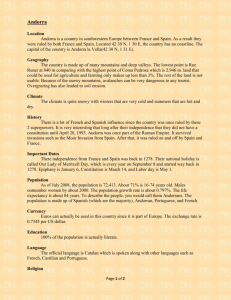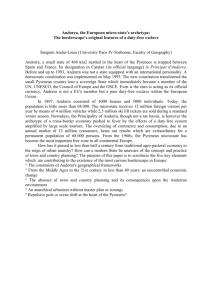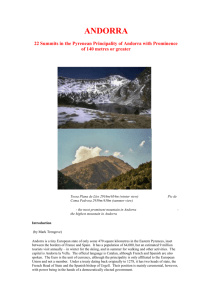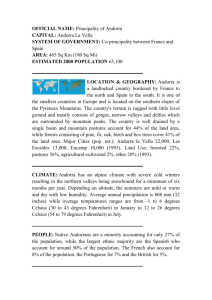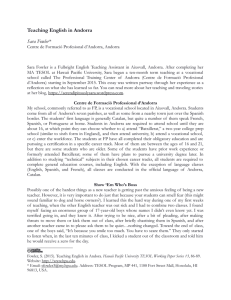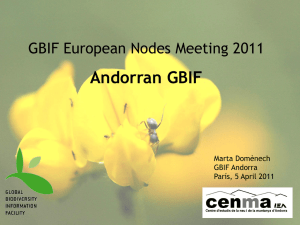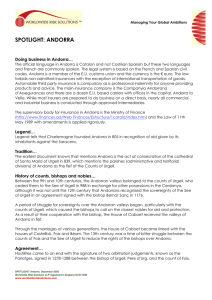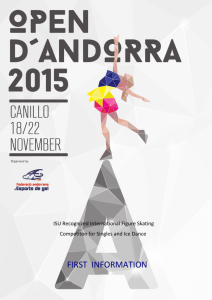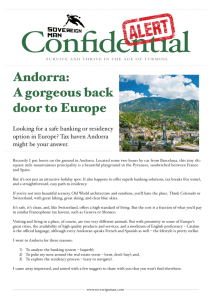ANDORRA
advertisement
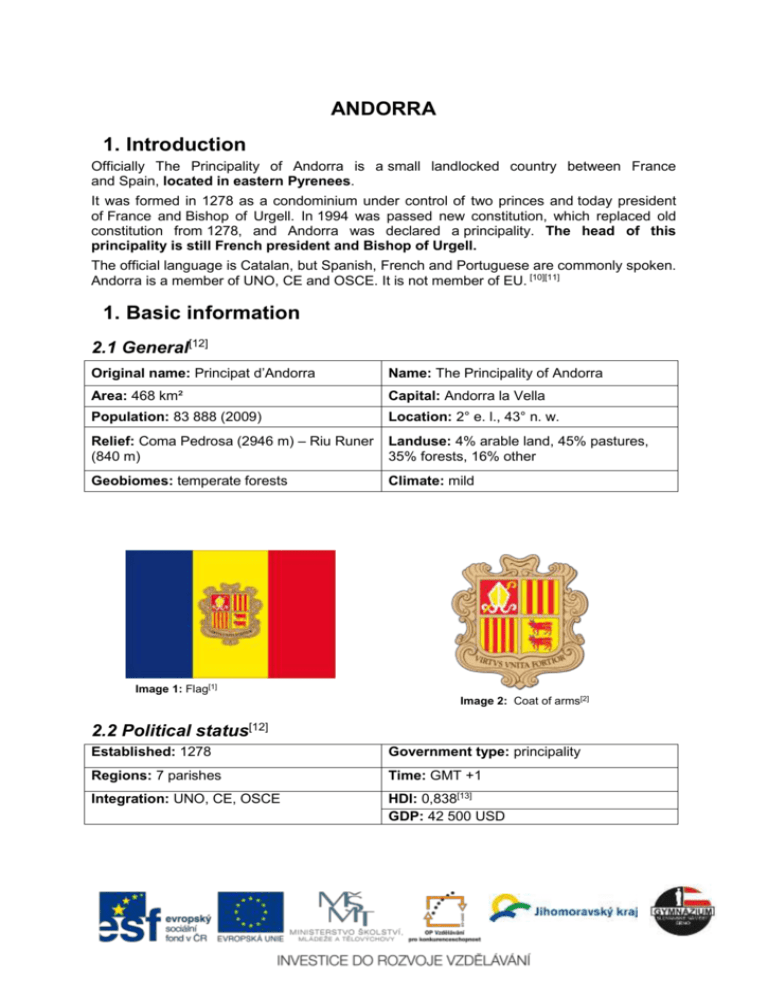
ANDORRA 1. Introduction Officially The Principality of Andorra is a small landlocked country between France and Spain, located in eastern Pyrenees. It was formed in 1278 as a condominium under control of two princes and today president of France and Bishop of Urgell. In 1994 was passed new constitution, which replaced old constitution from 1278, and Andorra was declared a principality. The head of this principality is still French president and Bishop of Urgell. The official language is Catalan, but Spanish, French and Portuguese are commonly spoken. Andorra is a member of UNO, CE and OSCE. It is not member of EU. [10][11] 1. Basic information 2.1 General[12] Original name: Principat d’Andorra Name: The Principality of Andorra Area: 468 km² Capital: Andorra la Vella Population: 83 888 (2009) Location: 2° e. l., 43° n. w. Relief: Coma Pedrosa (2946 m) – Riu Runer (840 m) Landuse: 4% arable land, 45% pastures, 35% forests, 16% other Geobiomes: temperate forests Climate: mild Image 1: Flag[1] Image 2: Coat of arms[2] 2.2 Political status[12] Established: 1278 Government type: principality Regions: 7 parishes Time: GMT +1 Integration: UNO, CE, OSCE HDI: 0,838[13] GDP: 42 500 USD 2 2. Map skills Image 3: Map of Andorra[3] Image 4: Map of regions[4] 3. Population and settlement 3.1 Demography The population of Andorra is approximately 84 000 people. It is the 202nd most populous country in the world. In 1948 the average population was 5 500 people. It grew to 25 700 within twenty years. In 2000 the number of inhabitants was 65 900. In ten years the population grew to nearly 84 000 people. The density of population is 179 inhabitants/km². The fertility rate in Andorra is 1,33 children born per woman. 15,5% are people between 014 years, 72,2% people are between 15-64 and 12,3% over 65. Life expectancy is 80 years for men and 84 for women. It is the 4th highest life expectancy in the world. Majority of people are Spanish (46%) and Andorrans (20%). Other minorities are: French, Portuguese and Arabs. [14] 3.2 Religion In Andorra there are 95% Roman Catholics. The patron saint of Andorra is Our Lady of Meritxell. Our Lady of Meritxell is also a Roman Catholic statue depicting an apparition of the Virgin Mary. There is also Muslim community (3%). It is primarily made of North African immigrants. There is a small community of Hindus and there live approximately 100 Jews. [10][27] 3.3 Languages The historic and official language is Catalan, which is a Romance language. Because of immigration and geographic proximity there are also commonly spoken Spanish, French and Portuguese. Most Andorrans can speak one or more of these languages. English is not so commonly spoken, but it is understood in major tourist destinations. [10] 3 3.4 Settlement Rank: Parish: Population: Area: 1. Andorra la Vella 24 574 30 km² 2. Canillo 4 663 110 km² 3. Encamp 13 225 84 km² 4. Escaldes-Engordany 16 078 30 km² 5. La Massana 9 664 65 km² 6. Ordino 3 066 90 km² 7. Sant Julià de Lòria 9 207 61 km² Table 1: Population of parishes [15] [16] [18] [17] [18] [19] [20] [21] 4. Economy The principal component of economy of Andorra is tourism. It accounts for roughly 80% of GDP. In 2007 the GDP per capita was $42 500. It is estimated that annually visit Andorra 9 million tourists. They are mostly attracted in Andorra’s duty-free status. Also people from Spain and France are widely using shopping without taxes. It is the reason why Andorra has a status of “tax haven”. There is only 4% of arable land so most food has to be imported. There are 45% of pastures and main livestock activity is sheep breeding. Andorra is not a member of European Union but current currency is euro. It is also treated as a member of EU for trade in manufactured good and as a non-member of EU for agriculture products. The main manufacture goods are cigarettes, cigars and furniture. The main agriculture products are wheat, barley, oats, vegetables, rye and sheep. In Andorra there are deposits of iron in the valley of Ordino but the access is very difficult. In addition to iron there are also mined small amounts of lead. [22] 5. Tourism The key attractions are shrines, festivals and churches. These are located in Ordino, Emcamp, Sant Julia de Loria, Les Escaldes and Santa Coloma. The best known shrine is Our Lady of Meritxell. Big part of tourism takes of course skiing and capital Andorra la Vella were are plenty of churches such as Santa Coloma Church. It is pre-Romanesque church with a wooden framed ceiling and a quadrangular apse. The building was decorated with 12th century Romanesque mural paintings by the master painter of Santa Coloma. [23] [24] [25] 6. Key studies Pyrenees in Andorra Almost the whole area of Andorra takes Pyrenees. It is a range of mountains in southwest Europe that separates the Iberian Peninsula from the rest of continental Europe. The highest point is Aneto and its elevation is 3404 m. In Andorran Pyrenees there are iron mines at several locations. There are also some hot springs in Les Escaldes in Andorra. The ski resorts in Andorra are: Pas de la Casa, Soldeu and Vallnord.[26] 4 7. Pictures Image 6: Santa Coloma Church[6] Image 5: Chapel od Meritxell[5] Image 8: Chaldea Center[8] Image 7: Andorra lake[7] Image 9: Andorra la Vella[9] 5 9. Videos Sightseeing: http://www.youtube.com/watch?v=Ji21497C9sk&feature=player_embedded Little Europe: Andorra: http://www.youtube.com/watch?v=B10DiNXmFQM&feature=fvwrel Sightseeing: http://www.youtube.com/watch?v=f2IB8WEVd5c&feature=player_embedded#! 10. Tasks What is the official language of Andorra? Is there any other language which is commonly spoken? When was Andorra established? Who is the head of this principality? What is currency of Andorra? Why? Describe economy of Andorra. 11. Dictionary Principality Parish 12. References 12.1 Resources and tables Encyklopedie UNIVERSUM A-F, díl 1., vydalo nakladatelství Odeon v Praze toku 2002 [10] http://en.wikipedia.org/wiki/Andorra [11] http://cs.wikipedia.org/wiki/Andorra [12] http://www.zemepis.com/Andorra.php [13] http://en.wikipedia.org/wiki/List_of_countries_by_Human_Development_Index [14] http://en.wikipedia.org/wiki/Demographics_of_Andorra [15] http://en.wikipedia.org/wiki/Andorra_la_Vella [16] http://en.wikipedia.org/wiki/Canillo [17] http://en.wikipedia.org/wiki/Encamp [18] http://en.wikipedia.org/wiki/Escaldes-Engordany [19] http://en.wikipedia.org/wiki/La_Massana [20] http://en.wikipedia.org/wiki/Ordino [21] http://en.wikipedia.org/wiki/Sant_Juli%C3%A0_de_L%C3%B2ria [22] http://en.wikipedia.org/wiki/Economy_of_Andorra [23] http://en.wikipedia.org/wiki/Tourism_in_Andorra [24] http://en.wikipedia.org/wiki/Our_Lady_of_Meritxell [25] http://www.andorra.ad/en-US/Resources/Pages/Esglesia_Santa_Coloma.aspx [26] http://en.wikipedia.org/wiki/Pyrenees [27] http://en.wikipedia.org/wiki/Andorran_Jews 6 12.2 Images [1] Image 1: http://www.olstars.com/images/flags/Big/ad.gif [2] Image 2: http://files.geoweb.webnode.cz/200000004-1359914534/Obr%C3%A1zek3.png [3] Image 3: http://www.worldatlas.com/webimage/countrys/europe/adnewzzz.gif [4] Image 4: http://www.ezilon.com/maps/images/europe/Andorra-plotical-map.gif [5] Image 5: http://img.geocaching.com/cache/log/402677b9-57dc-4536-a90f-5c17bce271a3.jpg [6] Image 6: http://www.orthodoxengland.org.uk/andorra.jpg [7] Image 7: http://www.hola-andorra.com/arinsal/pics/juclar1.jpg [8] Image 8: http://www.metrolic.com/wpcontent/uploads/2011/02/9caldea_centro_termoludico 01.jpg [9] Image 9: http://www.slantour.cz/foto/full/2771-andorra-la-vella.jpg
